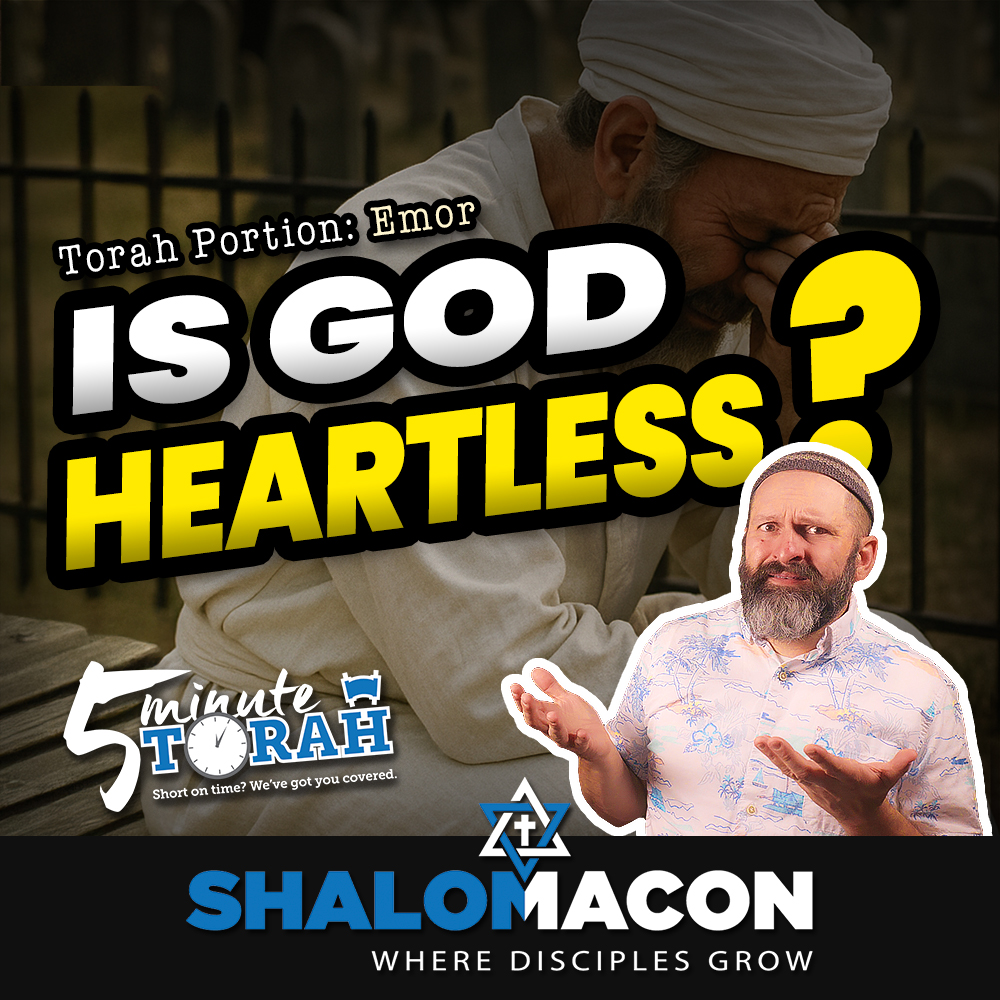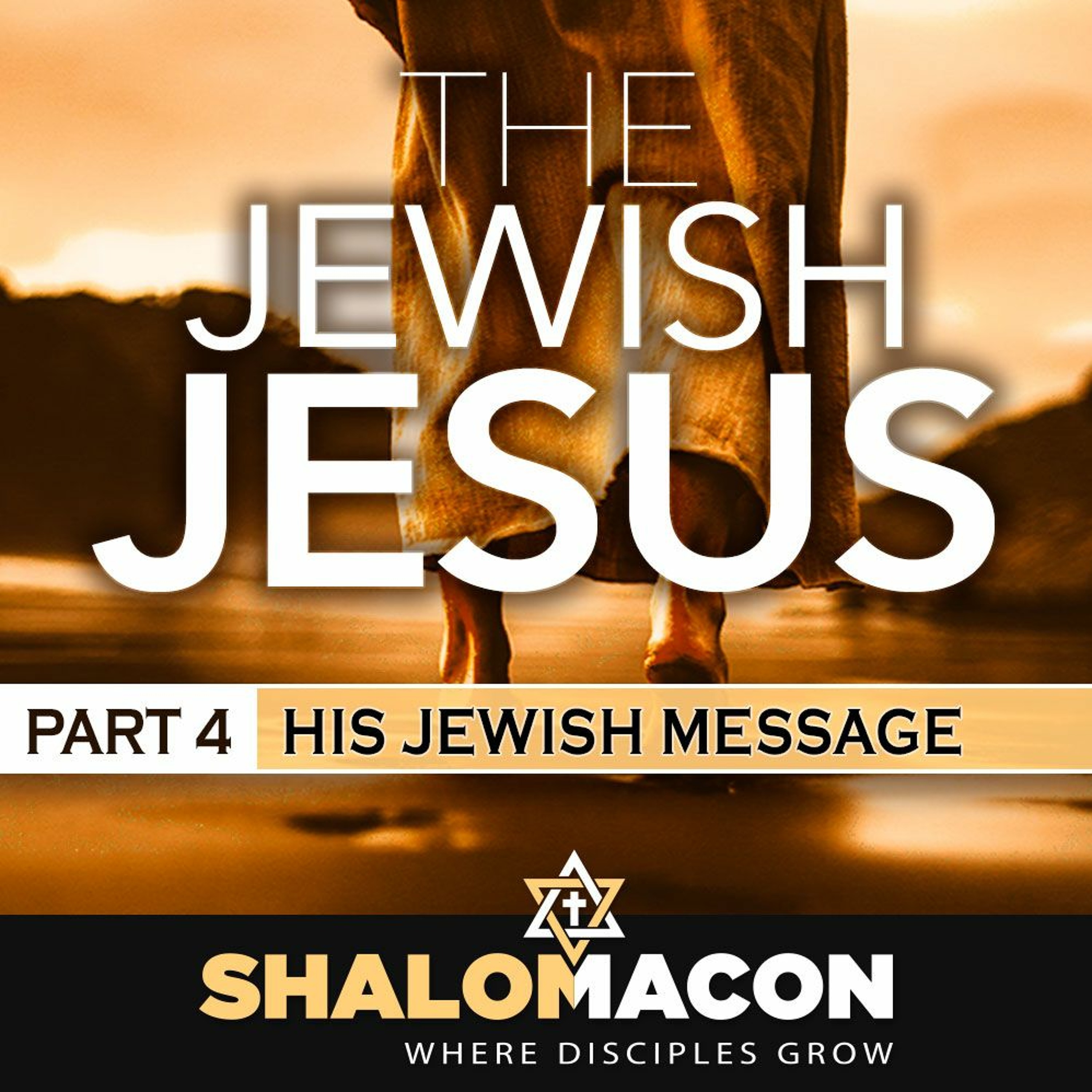Episode Transcript
[00:00:00] Sometimes the Torah's laws can appear harsh and lacking empathy. Take for instance, the commandment in this week's Torah portion that a Cohen, a priest, is not allowed to attend the funeral of his own wife. This is pretty harsh, right? But does the Torah really say that? Or have we projected our own feelings toward God in this text? Which one is it? Let's find out in this week's five Minute Torah Shalom and Blessings from Shalom Making the place where disciples of Yeshua learn, connect and grow. I'm Darren, and before I get into the five minutes of my five Minute Torah commentary, let's cover a few quick facts about this week's Torah portion. This week we're studying the 31st portion of our Torah reading cycle. We are studying the portion of Imor Leviticus 21:1, 24:23 and here are the three things that you need to know about it. Number one extreme holiness the life of the Kohen, the Torah portion and more places a strong emphasis on the concept of priestly holiness, setting forth specific regulations that the priests, the Kohanim, must follow to maintain their ritual purity and suitability for service in the tabernacle and of course later the Temple. These regulations encompass both physical and ritual aspects, underscoring the priests unique role as intermediaries. But between the Israelites and God, priests are prohibited from contact with dead bodies except for their closest relatives to avoid ritual impurity. They also face restrictions in marital choices and are only allowed to marry women who meet certain standards of purity. Additionally, priests with physical deformities are excluded from performing certain sacred rites, although they still share in the priestly food. These stringent requirements highlight the broader theme of holiness and separation from worldly defilements, ensuring that those who serve directly in God's presence exemplify the utmost sanctity, reflecting the divine holiness community they lead in worship. 2. Blasphemy and its Severe Consequences in our current Torah portion, the topic of blasphemy and its punishment is addressed through a specific incident involving a man who blasphemes the name of God. This episode highlights the seriousness that blasphemy holds in God's eyes. The narrative recounts how the blasphemer, the son of an Israelite woman and an Egyptian man, curses God's name during a fight. He is brought before Moses and God commands that the entire community must stone him to death. This severe punishment reflects the sanctity of God's name and the grave nature of disrespecting it. It serves as a powerful deterrent, illustrating the broader principle that words have profound power and that we should uphold the holiness of God's name at all times. This incident, along with its consequences, emphasizes the importance the reverence for God and His Name should have among his people Number three Festivals the Go to Chapter if you're looking for details on one of the biblical festivals, Leviticus 23 is the address. This entire chapter is focused on spelling out the biblical calendar and festival cycle, beginning with the weekly Sabbath, which serves as a regular reminder of creation and ceasing from our own labors. The portion also outlines the major annual festivals Pesach or Passover, commemorating the exodus from Egypt Shavuot, the Feast of Weeks celebrating the giving of the Torah at Sinai and Sukkot, the Feast of Tabernacles, remembering the Israelites wilderness journey. It also details the observances of Rosh Hashanah, the Civil New Year, Yom Kippur, the Day of Atonement, and other sacred assemblies. Each festival involves specific rituals, offerings and prohibitions, reflecting the holiness and unique aspects of each one. Through these observances, the Torah emphasizes the sanctification of time and creates a rhythm of worship and remembrance that shapes the lives of the people of God. Are you a disciple of Yeshua? There are a lot of people who say they are, but when it comes down to it, they really don't even know what it means to be a disciple. Why? Because discipleship is a concept unique to Judaism. It's an intimate relationship between a rabbi and his student. Yeshua called 12 men to be in his inner circle of discipleship, and those 12 men changed the world. What did they know about being a disciple that we don't? I wrestled with this question when I wrote my book the Four Responsibilities of a Disciple. There were a ton of books already written on how to make disciples, but I wanted to know what it meant to be a disciple, and because it seems that all of these disciples that were being made in our day really weren't having an impact on the world around them like they should. I found out that there were four responsibilities every disciple should know and that when implemented, living out these four responsibilities has the potential to change the world. If you want to know what it means to be a true disciple of our Master Yeshua, then check out my book the Four Responsibilities of a Disciple, using the link below. This week's Torah commentary is called the Relative Nearest Hymn and comes from book 5 minute Torah, volume 3, Parashat Imora Torah portion Imor begins with a problematic passage. Through Moses, God gives instructions to the priesthood prohibiting them from becoming ritually impure through corpse contamination. This rule has exceptions, however, and the Torah gives a list of close relatives by which a priest may allow himself to become ritually impure. This could be through either attending the body of the deceased or merely attending their funeral. And the Lord said to Moses, speak to the priests, the sons of Aaron, and say to them, no one shall make himself unclean for the dead among his people, except for his closest relatives, his mother, his father, his son, his daughter, his brother, or his virgin sister who is near him because she has had no husband for her, he may make himself unclean. Leviticus 21:1 3. In this passage, we learn that a priest may attend to the body of six different family members, his mother, his father, his son, his daughter, his brother, or his unmarried sister. However, this list seems a little incomplete. What about his wife?
[00:06:21] Is the Torah so insensitive that it does not allow a priest to attend the funeral of his own wife, even though she's not physically or biologically related to him, as the others in the list are? Shouldn't the Torah make an exception for his beloved wife? If we understand the Torah the way our rabbis do, then the Torah speaks plainly about the inclusion of the wife of a priest in this list. Our English translations introduce the list of exceptions with the descriptive phrase his closest relatives. However, a more accurate translation of this phrase would be for the relative nearest him, rather than an introduction to the list of six relatives that he may become ritually contaminated by. The Torah is actually referring to a seventh family member, the one whom he is closest to. Who is this person who is closer than these other six family members? Rashi, stating the general consensus by the majority of rabbinic interpretations, says, it is none other than than his wife. How is it that his wife, who is not a blood relative, is included in this list? This is based on the creation account in which Eve was taken from the very flesh of Adam and then given back to him. When he sees her for the very first time. His reaction is, this at last is bone of my bones and flesh of my flesh. She shall be called woman because she was taken out of man. Genesis 2:23. Adam saw his newly acquired wife as not merely another individual, but an extension of himself. The very next verse of the Torah emphasizes this point by declaring, therefore, a man shall leave his father and his mother and hold fast to his wife, and they shall become one flesh.
[00:08:09] Throughout history, this sacred unity has been under attack from infidelity, divorce, neglect, abuse, and redefining the boundaries of marriage. According to standards Contrary to the biblical parameters, the relationship between a husband and wife has constantly become the victim to the whims of our flesh and the toxic culture we live in. The Torah teaches us that a man's wife becomes one with his own flesh, so his poor treatment of her is detrimental to himself. We also read, he who finds a wife finds a good thing and obtains favor from the Lord.
[00:08:49] This is how we should view this sacred and mysterious unity of a man and woman. We should always remember that we find within it one of the most precious gifts God has given to human beings. The Holy Scriptures place great value on a faithful and godly wife, so much that we recite Proverbs 31:1031 every Friday night to remind us of of her value. An excellent wife who can find she is far more precious than jewels. The heart of her husband trusts in her, and he will have no lack of gain. She does him good and not harm all the days of her life. This is verses 10:12 the Levitical priesthood could not allow themselves to become ritually impure except for the most strict circumstances, which included the deaths of their nearest relatives.
[00:09:38] God created an exception for the deaths of those relatives. Lest we believe God is insensitive to a man who just lost his wife, the Torah informs us that he may become unclean for the relative nearest him. Who is closer to a man than his wife?
[00:09:53] No one. She is the relative nearest him. The next time we're tempted to believe that God is less than empathetic, let us consider his compassion toward husband and wife.
[00:10:03] Here's a bonus tip for you mentioned. If you're a man, then I want to speak directly to you for a moment. First. If you're married, then I want to challenge you to make your wife top priority in your life. If you're struggling in your marriage, then talk with someone you can trust but who also has a healthy marriage. If God thinks the relationship between a husband and wife is vitally important, so should we. And if you're not married, then make the commitment now that when God brings your future spouse into your life, you will make her the top priority, that you will cherish her and protect her even from yourself. A godly family and a godly family heritage begin with a committed and loving marriage. Whether you're currently married or hope to be one day, make the commitment now that whatever difficulties you may encounter in your relationship, you will work to resolve them through loving communication and prayer. We need more healthy marriages among the followers of Yeshua. On a completely unrelated note, if you want to understand how Rabbinic literature helps better understand the teachings of Yeshua, then I've got the perfect series for you. A few years ago, I published a series of videos on a rabbinic text called Perkei Avot, also known as Ethics of the Fathers. My series is called Perkei Vot and the Teachings of Yeshua. You should check it out. It'll revolutionize the way you look at both Rabbinic literature and the teachings of our Master. Just check out the Luke Sam.



